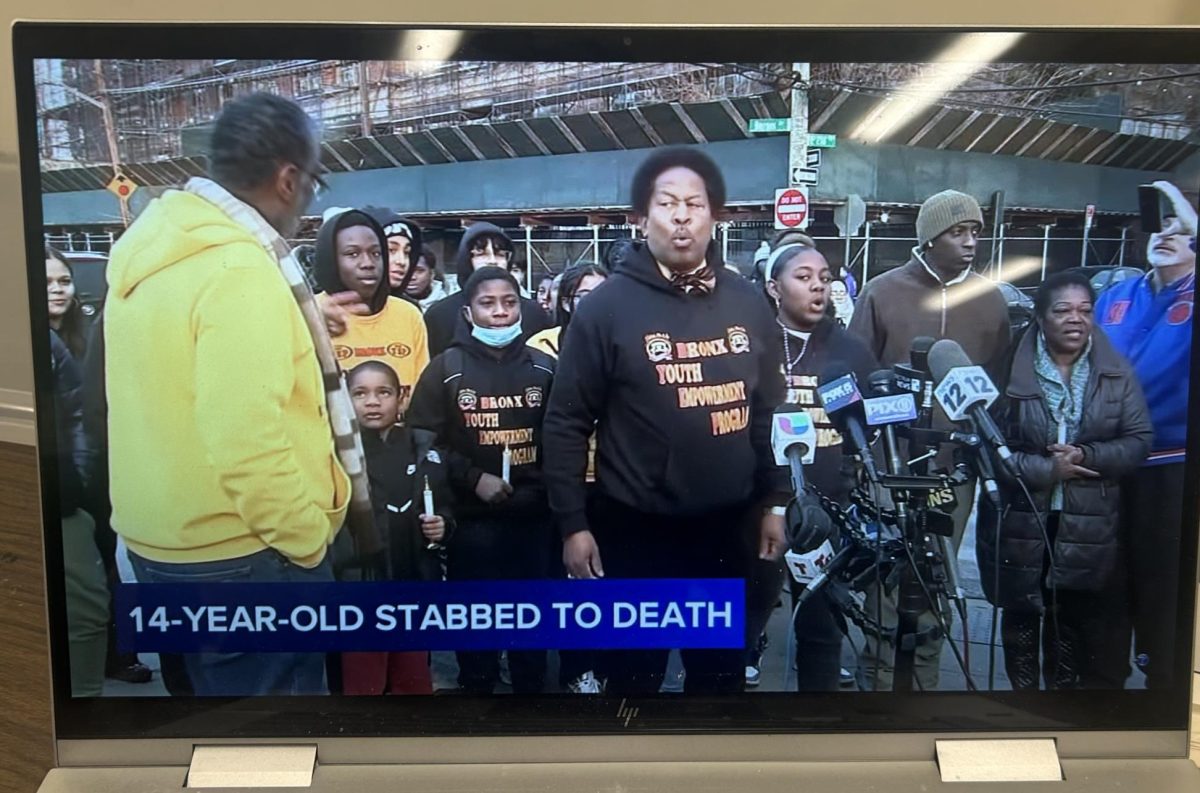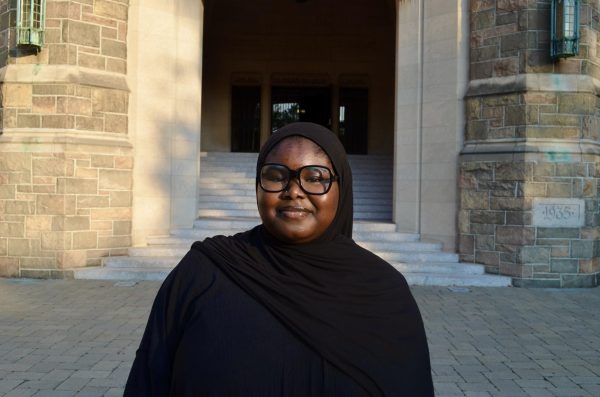14-year-old Bronx native Caleb Rijos was fatally stabbed on his way to school early last month. Days later, Bronx community members, friends and family gathered at a vigil organized by the Bronx Youth Empowerment Program to honor and remember Rijos.
Andy King is the co-founder and volunteer director of the Bronx Youth Empowerment Program, where Rijos participated. King said he was an exemplary student and young man.
“He played on the football team, was a child full of delight, you wanted to be around him,” said King. “He had a great personality and was always willing to help. He was one of the children who was getting it right.”
King said the Bronx Youth Empowerment Program organized this vigil and counseling sessions preceding it to support Rijos’ classmates, teachers, loved ones and community as they come together and mourn.
“We read scripture and helped them navigate through their emotions so they could understand how to get through the next day,” said King. “It was solemn, it was sad, and there was confusion. People still couldn’t understand how he was gone.”
Supporting Bronx youth and the broader community through tragedy and hardship aligns with the mission of the Bronx Youth Empowerment Program, which is currently in its 20th year of supporting youth throughout the Bronx.
“Our mission is building mind, body, and serving the community,” said King. “We offer weekly counseling and informational sessions; we also enjoy putting them in empowerment positions.”
Their programming connects kids to senior citizens and even to the NYPD to improve those relationships. Youth involved in the program also host a forum to address their concerns about growing up in today’s society, giving them key empowerment, organizational and public speaking skills.
As organizations like the Bronx Youth Empowerment Program work to build community, the recent string of violent crime here in New York City threatens that. While overall crime in NYC is down, “felony assaults in the system are up 55 percent since 2019,” as the New York Times reports.
There are debates about why there is such an increase in violent crime. For King, he feels that economic insecurity leads to increased crime.
“Anytime you have a lot of violence, it’s because people’s economic conditions are bad. If you have, you’re not trying to go out and take,” said King. “That’s the first issue you have to address.”
Moving beyond economic insecurity, the general consensus is that the city and state of New York need to reevaluate how they are dealing with the ongoing mental health crisis.
Bill Berg is a professor of political science at Fordham University whose interests include New York City politics and public health. Berg argues that the increase in felony assaults is tied to the mental health treatment crisis.
“Many of these people who are committing these assaults have mental and emotional issues; they should be getting treatment, but they’re not, and as a result, we’re seeing this uptick in crime,” said Berg. “That may be the best explanation for what’s going on.”
During her State of the State address earlier this year, Gov. Kathy Hochul recommitted herself to increasing accessibility to mental health treatment for anyone who might need it. Specifically, she said she would strengthen New York’s involuntary commitment laws. In a press statement from Jan. 14, Hochul details that, “the updated law will allow intervention when individuals are at substantial risk of harm due to their inability to meet basic needs like food, shelter, or medical care.”
This form of intervention is one of the only proposed solutions to rising to the challenge that criminals with mental illness pose. Berg argues that involuntary commitment raises concerns about violating individuals’ Constitutional rights.
“What we as New Yorkers, what we as a society at large do with those people who have mental problems that result in them committing violence who at the same time refuse to accept treatment to address that, that is a long term Constitutional issue,” said Berg. “They have the right to refuse treatment; at the same, we, as a society, have the right to feel safe. That’s for the courts to work out in the long term.”
Governor Hochul and New Yorkers are grappling with this balance of public safety and individual rights. King feels that involuntary commitment is a viable solution.
“The gentleman who killed [Rijos] should have never been on the street, and that’s a flaw in the adults who have taken the oath to improve society,” said King. “If the governor and the mayor are going to put a safety plan together to remove people off the street and utilize buildings that are not occupied, and figure out how to put investments in there with some social services and work at the same time, help people stabilize themselves, then so be it.”
Especially as New Yorkers navigate complex issues like violent crime and mental health treatment, Berg argues that we must be wary about headlines that sensationalize violence and ensure that we stick to the facts.
“Looking at the data as opposed to anecdotal evidence coming from the media, we should be concerned, and we should expect our elected officials to do something to address it,” said Berg. “I don’t put a lot of stock in the anecdotal. Even though the crimes are horrific, there were always these kinds of crimes. Murders in NYC are down. NYC is the safest large city in the country. Has been for decades, continues to be. So why isn’t the media playing that up?”
Although the isolated instances of violent crime are tragic and should be addressed, Berg and King are not letting them dominate their everyday life. Despite recent increases in subway violence, Berg still rides the subway.
“I ride the subways on a regular basis. The subways are crowded. It’s standing room only. When I ride the subway as a New Yorker, I’m wary. I’m watchful. But, that’s always the case,” said Berg. “Are people not riding the subways? It looks to me like the subways are just as crowded as they were before.”
King is working to hold elected officials accountable, advocating to reform the way people think about mental health within the criminal justice system.
“One of the things I’m working with a friend of mine who’s on the [City] Council, I’m creating something called Caleb’s Law,” said King. “The gist of it is: if you kill a child under the age of 18, other than for self-defense, you can no longer just use ‘mentally ill.’ You gotta be better than that… You don’t get to use up our system, get three meals and a bed, and we are taking care of you, but the kid that you killed is buried, and his family is grieving forever.”
As Governor Hochul works to strengthen involuntary commitment laws and address increased violent crime, New Yorkers like King and Berg are grappling with the threat of violent crime, advocating for change and their daily lives on top of that.









































































































































































































